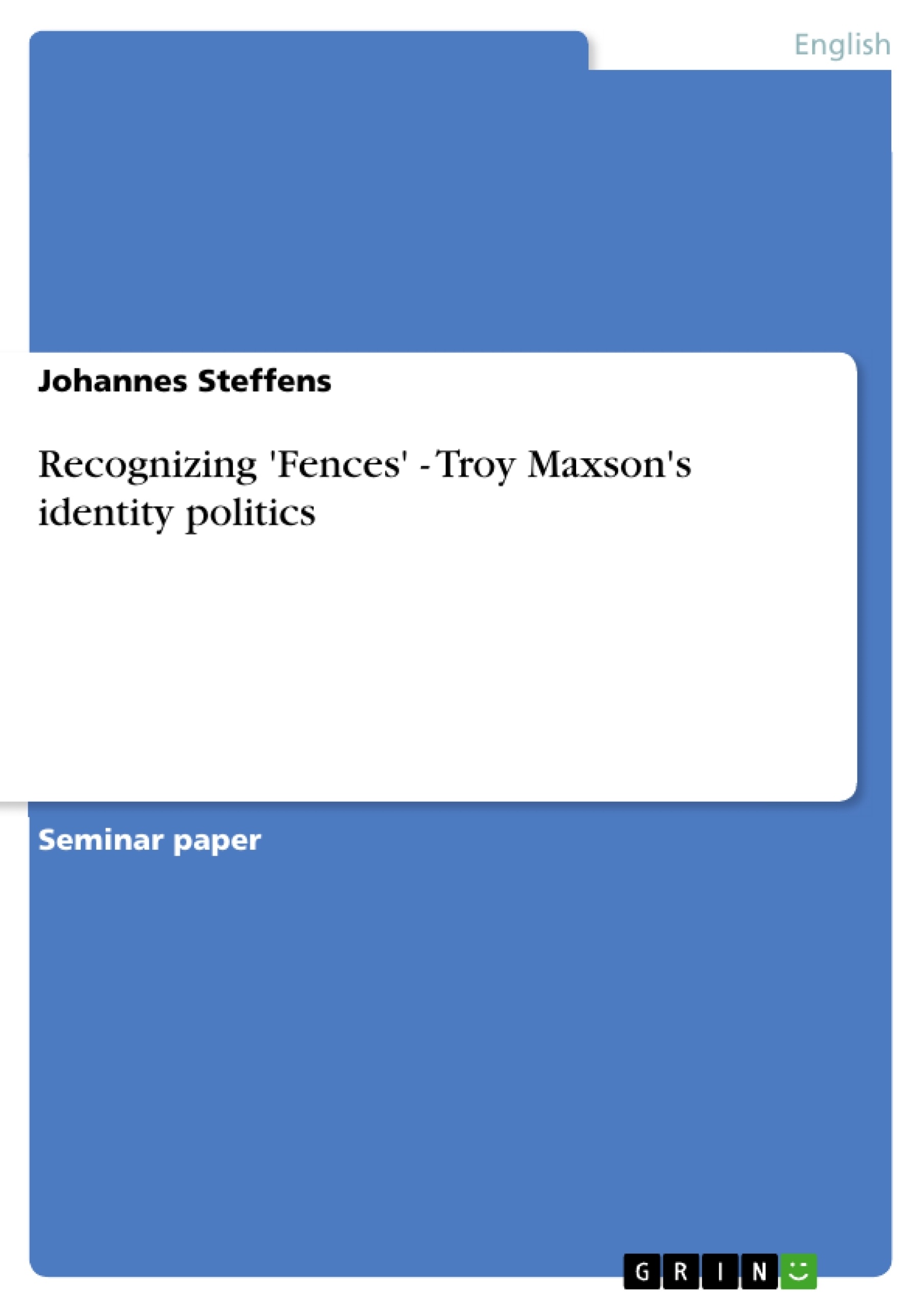August Wilson’s 1985 play Fences focuses on black urban life in the late 1950s and deals with intergenerational conflicts, racial issues, distress, and the search for one’s identity and position in life. The play’s protagonist, Troy Maxson, has been turned into a loud-mouthed, hard-hearted, and occasionally “crude and almost vulgar” (Wilson 1987, 1) oppressor as a result of the hardships of Afro-American life in the first half of the 20th century and the experiences of his youth; Troy abandoned home at the age of fourteen, after being beaten up by his sadistic father for having watched him rape a thirteen-year-old girl.
This paper is intended to examine the identity politics in Fences and will focus on the conflict between Troy and his second son Cory. First, it will highlight the importance of recognition for the development of human beings according to Charles Taylor’s theory and then show the negative effects of misrecognition and nonrecognition. Secondly, it will show the different phases of Troy’s misrecognition in the play and analyze how this leads to a mutilation of Cory’s personality.
Table of Contents
- Introduction
- Endowing Identity
- Troy and Cory
- Career Advancement
- The Economics of Duty
- The Consequences of Misrecognition
- Conclusion
Objectives and Key Themes
This paper investigates the theme of identity politics in August Wilson's play *Fences*, focusing on the conflict between the protagonist, Troy Maxson, and his son, Cory. It explores the significance of recognition in shaping identity, drawing on Charles Taylor's theory. The paper examines the detrimental effects of misrecognition and nonrecognition on individuals, particularly in the context of Troy and Cory's relationship.
- Identity politics in August Wilson's *Fences*
- The role of recognition in shaping identity
- The negative consequences of misrecognition and nonrecognition
- The complex relationship between Troy and Cory
- The impact of societal and historical factors on identity formation
Chapter Summaries
The Introduction provides a brief overview of the play's setting and main themes, highlighting the character of Troy Maxson and his experiences as an African-American man in the 1950s. The paper's objective to examine the identity politics in *Fences* is outlined.
The chapter titled "Endowing Identity" explores the significance of recognition in shaping identity. It discusses Charles Taylor's theory of recognition and its connection to self-identity, emphasizing the detrimental consequences of misrecognition and nonrecognition.
The chapter "Troy and Cory" delves into the complex relationship between Troy and his son, Cory. It analyzes how Troy's misrecognition of Cory, stemming from his own past experiences and societal limitations, affects Cory's personal development.
Keywords
Key terms and concepts explored in this paper include identity politics, recognition, misrecognition, nonrecognition, intergenerational conflict, African-American identity, societal limitations, and the impact of personal experiences on identity formation. The analysis draws on Charles Taylor's theory of recognition and its relevance to understanding the complex dynamics of identity construction and its challenges.
Frequently Asked Questions
What is the main theme of August Wilson's 'Fences'?
The play focuses on black urban life in the 1950s, dealing with intergenerational conflicts, racial issues, and the search for identity and recognition.
How does the theory of recognition apply to the characters?
The paper uses Charles Taylor’s theory to show how recognition is vital for human development and how misrecognition by others can negatively impact self-identity.
Why is the conflict between Troy and Cory central to the play?
Troy’s past hardships lead him to misrecognize Cory’s potential, particularly regarding his career advancement, which results in a mutilation of Cory’s personality.
What are the "Economics of Duty" mentioned in the paper?
This refers to Troy's perspective on fatherhood, where he prioritizes providing material needs as a duty over emotional connection and recognition of his son's desires.
How do societal factors influence identity in 'Fences'?
The hardships of Afro-American life in the early 20th century and systemic racial issues are shown as primary drivers for the characters' defensive and hard-hearted identities.
- Quote paper
- Johannes Steffens (Author), 2006, Recognizing 'Fences' - Troy Maxson's identity politics, Munich, GRIN Verlag, https://www.grin.com/document/63798



